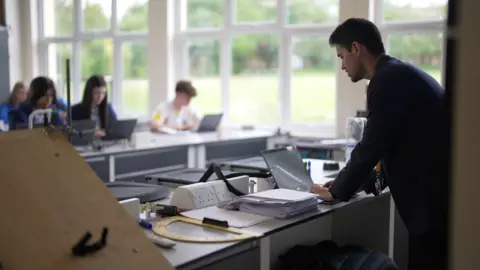Private school parents must pay 'fair share', court told
 BBC
BBCThe government has defended its policy of adding VAT to private school fees, telling the High Court it enhances "the fairness of the tax system overall".
Barristers representing Chancellor Rachel Reeves, as well as HMRC and the Department for Education, said they wanted to raise standards for the 94% of children who attend state schools by making private school parents pay "their fair share".
A judicial review of the policy has been brought by three separate groups, including parents of children with special educational needs and disabilities (Send) and low-paying faith schools.
They claim the policy is incompatible with human rights law and is discriminatory.
The policy was part of Labour's manifesto during the general election last year and was implemented on 1 January across the UK.
Sir James Eadie, the First Treasury Counsel, told the court there was no obligation for the government to subsidise private education in any way.
The main objective of the VAT policy is to raise additional tax revenue to invest in public services, "including the state education system", the government argued.
It consulted extensively on the policy design, "weighing the pros and cons" of possible exemptions for small faith schools, international schools and children with special education needs.
They also looked at whether introducing it in September 2025, rather than January 2025, would be more appropriate, the court was told.
The government said it rejected the exemptions after a consultation, arguing it would be "unworkable and administratively onerous" and that delaying the timing of it coming in would affect the amount of money it raised.
Only fees for children with a local authority education, health and care plan (EHCP) which names their specific school will continue to be exempt.
Sir James said parents who wish to opt out of the system of "universally accessible, state-funded education" are free to choose any private education for their child that they can afford, or "to educate their child at home".
The argument that increasing the cost to parents who choose a private school would be an infringement of the common law "is plainly not right", he wrote in his submissions.
The government wants all three claims to be dismissed.
The legal challenge is being brought by families who say their needs "cannot be adequately met in the state sector".
Jeremy Hyam KC, representing two children with Send in private schools, told the court that it is estimated 6,500 children who have Send, but who do not have EHCPs, would leave the private sector as a result of the VAT changes, based on the government's own evidence.
He said it was "not fair" to remove vulnerable children from a school where their needs are met, to an environment where they are not met, without "weighty justification".
Bruno Quintavalle, representing four small Christian schools, said the "ill thought-out proposal" was introduced in haste.
If the legal challenge is successful, the government could consider whether it would amend the policy, but it would be under no obligation to do so.
The hearing is due to conclude on Thursday and a decision is expected at a later date.

Sign up for our Politics Essential newsletter to keep up with the inner workings of Westminster and beyond.
